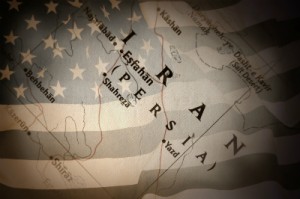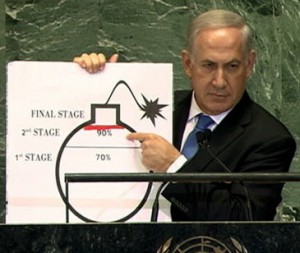Former Iran-desk State Department staffer Reza Marashi and journalist Sahar Namazikhah remind us that Iran’s influnetial Ministry of Intelligence and Security (MOIS) has publicly recognized the benefits of negotiating with the US to avert a military conflict through a report that’s available on their website. “To that end, the Intelligence Ministry [...]]]>
 Former Iran-desk State Department staffer Reza Marashi and journalist Sahar Namazikhah remind us that Iran’s influnetial Ministry of Intelligence and Security (MOIS) has publicly recognized the benefits of negotiating with the US to avert a military conflict through a report that’s available on their website. “To that end, the Intelligence Ministry can play a role in planting ideas within the minds of Iran’s top decision-makers,” write Marashi and Namazikhah, adding that the MOIS report directly “articulates why President Obama is different than Israel”:
Former Iran-desk State Department staffer Reza Marashi and journalist Sahar Namazikhah remind us that Iran’s influnetial Ministry of Intelligence and Security (MOIS) has publicly recognized the benefits of negotiating with the US to avert a military conflict through a report that’s available on their website. “To that end, the Intelligence Ministry can play a role in planting ideas within the minds of Iran’s top decision-makers,” write Marashi and Namazikhah, adding that the MOIS report directly “articulates why President Obama is different than Israel”:
The primary obstacle? According to the MOIS, it is Israel – but not for the reasons many might assume. Rather than ideology, Iran’s Intelligence Ministry sees geopolitics as the driving force: “[Israel is concerned that] the balance of power in the region will be against the Zionist regime” and it therefore “considers enrichment a threat to its national security and wants to destroy Iran’s nuclear facilities”.
The way that Iran’s Intelligence Ministry distinguishes between Obama and Israel is important. As a key source of information in the Iranian system, the MOIS has said that Obama shows he is not willing to rush into war – and it has given him de facto credit for it. To that end, policymakers in Washington should carefully study this publication as a potential opening from Iran.
Gary Sick, an acute observer of US-Iranian relations for more than three decades who served on the National Security Council staff under president Ford, Carter and Reagan, meanwhile argues that the path to middle east peace goes through Tehran. But even if conditions are ripe for a serious attempt at reaching a deal — which President Obama seems interested in – both sides will need to make concessions:
The United States and its allies will have to accept a measure of Iranian domestic enrichment of uranium. Iran will have to accept limits on its entire nuclear infrastructure, subject to intrusive inspections and monitoring. Iran will need to document the history of its nuclear program, and the West will need to remove sanctions. All of this must happen in a step-by-step process with safeguards and verifications at each stage.
Writing in Al-Monitor, Banafsheh Keynoush argues that Iran’s hardliners are ready to engage, but won’t submit without serious incentives. Indeed, as Iran scholar Farideh Farhi points out, the key to moving the diplomatic process forward and avoiding a military conflict is flexibility on both sides:
]]>Unless Khamenei and company are given a way out of the mess they have taken Iran into (with some help from the US and company), chances are that we are heading into a war in the same way we headed to war in Iraq. A recent Foreign Affairs article by Ralf Ekeus, the former executive chairman of the UN special Commission on Iraq, and Malfrid-Braut hegghammer, is a good primer on how this could happen.
The reality is that the current sanctions regime does not constitute a stable situation. First, the instability (and instability is different from regime change as we are sadly learning in Syria) it might beget is a constant force for policy re-evaluation on all sides (other members of the P5+1 included). Second, maintaining sanctions require vigilance while egging on the sanctioned regime to become more risk-taking in trying to get around them. This is a formula for war and it will happen if a real effort at compromise is not made. Inflexibility will beget inflexibility.
This was the best of weeks; this was the worst of weeks. I am referring to last week’s ministerial meeting at the UN General Assembly – and of course I’m exaggerating.
For all who want to see Iran’s nuclear quarrel with the West resolved peacefully Prime Minister Netanyahu’s appearance before the [...]]]>
 This was the best of weeks; this was the worst of weeks. I am referring to last week’s ministerial meeting at the UN General Assembly – and of course I’m exaggerating.
This was the best of weeks; this was the worst of weeks. I am referring to last week’s ministerial meeting at the UN General Assembly – and of course I’m exaggerating.
For all who want to see Iran’s nuclear quarrel with the West resolved peacefully Prime Minister Netanyahu’s appearance before the Assembly was a god-send. This, surely, was the moment when he finally lost all credibility. Not only did he flirt with the grotesque by producing a ridiculous comic-book drawing of a bomb, he also implied that for the umpteenth time he had miscalled the imminence of an Iranian Armageddon.
Yet something tells me we have not heard the last from Mr. Netanyahu. Like Italy’s Silvio Berlusconi, he bounces back from making a fool of himself. At home in recent weeks he has been severely criticised for his misjudgements by Israel’s equivalent of the Great and the Good. Yet it seems his convictions remain intact.
And no doubt he will continue to be taken seriously by the mainstream media. When reporting on Iran the media like to recall – despite evidence to the contrary – that Iran is pursuing nuclear weapons. In future they ought to recall, when reporting the premonitions of Mr. Netanyahu, that his years in office have unbalanced him. But of course they won’t.
And so Mr. Netanyahu will continue to create political difficulties for all those who are trying to devise sensible solutions to a very difficult problem.
At least we can be confident that, if Mr. Obama is re-elected, he will not allow himself to be influenced by this hysteria. Twice this year the President has demonstrated that he has the measure of his Israeli “ally”. Last week, in his intervention before the Assembly, he made clear that he draws the line, sensibly, at Iran’s acquisition of nuclear weapons and not, as Mr. Netanyahu wants, at the acquisition of a weapons capability, long since a fait accompli, in any case, so far as the production of fissile material is concerned.
As for the worst – well, actually, the disappointing – I am thinking of a paper produced by Stephen Hadley and published by Foreign Policy on 26 September. The title was promising: Eight Ways to deal with Iran. But the contents could have been written in 2003. One peruses in vain for evidence that lessons have been learnt from the last nine years of Western dealings with Iran over its nuclear programme.
Instead, Mr. Hadley offers us strategic and tactical options that are familiar and stale, the same mix of carrots and sticks that have failed to deliver a solution because Iranians, as they like to remind us, are not donkeys. They are men as we are – men who understand the importance of maintaining self-respect and who know their rights.
The flawed nature of Mr. Hadley’s vision is apparent early on. He asserts that action is needed to stop Iran:
- - pursuing weapons of mass destruction
- supporting terrorists
- intervening in the internal affairs of neighbours
- infringing the freedom and human rights of the Iranian people
- and denying these people the right to a democratic future.
The extent to which Iran is guilty of these abuses could be questioned. So could the right of other states to put a stop to some of them. The sole point I want to make is that many other states, some of them on friendly terms with the US, are engaging in one or more of these practices; so why single out Iran for special treatment? Is the core issue the enforcement of international norms or the punishment of dissent?
One is hardly surprised to discover, on turning to option 6, a military strike, that Mr. Hadley makes no mention of the legal obstacles to attacking another state. To expect him to be familiar with UN Security Council resolution 487, which condemns military attacks on nuclear facilities as a violation of norms of international conduct and a threat to the nuclear safeguards regime, may be unreasonable. But can he really have spent all those years in the White House without reading the UN Charter?
Nor does he mention the highly toxic nature of the uranium gases that an attack on Iran’s plants would release into the atmosphere. Or the risk retaliation could pose for Saudi desalinated water supplies.
He suggests the US could avoid being seen as responsible for an attack. I suggest that, if Iran’s facilities are attacked, large parts of the world won’t wait for evidence or an avowal before determining responsibility. They’ll be as sure they know who’s responsible as is Mr Netanyahu when, within half an hour of a terrorist outrage, he proclaims Iran’s guilt.
In short, it appears Mr. Hadley has not seen that we need to break out of the mind-set which has doomed efforts to resolve this problem since 2003. We need policies which will minimise the risk that Iran will be tempted to exploit a dual-use capability which is not outlawed by the nuclear non-proliferation treaty. We need a diplomacy that addresses this motivational element in the threat equation, not least by recognising that Iran is entitled to have national interests and that double standards weaken global governance.
]]>